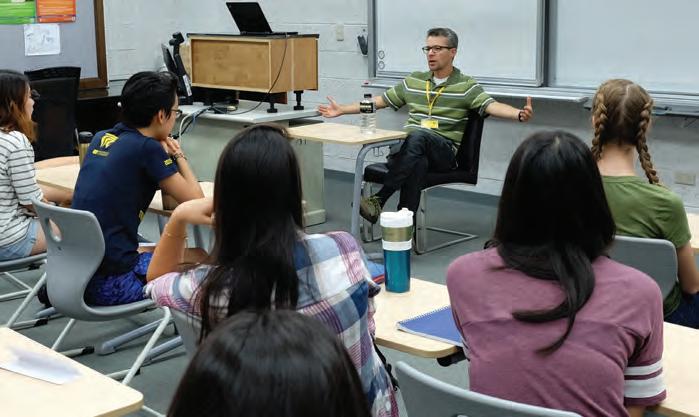
8 minute read
TAS NEWS
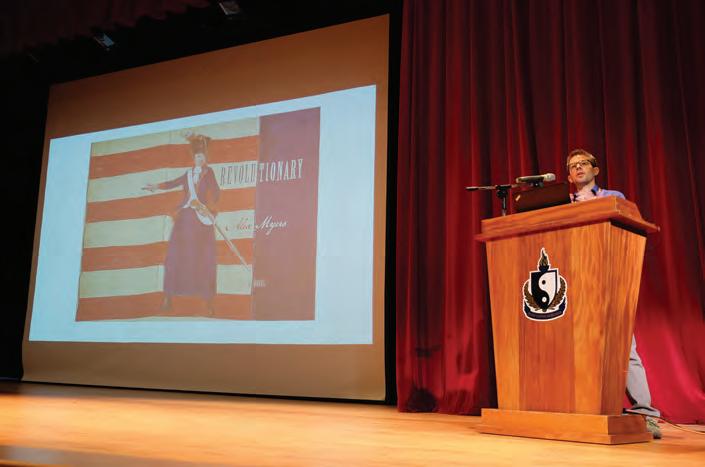
••••••••••••••••••••• •••••••••••••••••••••••• •••••••••••••••••••••••••••••••••••••••••••••• •••••••••••••••••••••••••••••••••••••••••••••••••• •••••• ••••••••••••••••••••••••••••••••••• 4 ••••••••••••••••••••••••••••••••••••••••••••••••••••••••••••••• •••••••••••••••••••••••••••• •••••••••••••••• ••••••••••••••••• •••••••••••••••••••••••••••••••••••••••••••••••••••••••••• •••••••••• •••••••••••••••••••••••••••••••••••••••••••••••••••••••••••••• ••••••••••••••••••• •• ••••••••••••••••••••••• ••••••••••••••••••••••••••••••••••••••••••••••••••••••••••••••• ••• • •• ••• •••• •••• ••••• •••••• ••••••• ••••••••
Author of Revolutionary Alex Myers at TAS The TAS Upper School hosted acclaimed author Alex Myers on campus during the first full week of classes. During that time, Myers discussed his book Revolutionary, which all Upper School teachers and students read before his visit. The book tells the story of Deborah Samson, a woman in colonial America that disguised herself as a man to fight in the final stages of the Revolutionary War. Described as “unforgettable” and “an evocative portrayal of life in the Continental Army” by The New York Times, the novel exposed the TAS community to a beautifully written story of courage and perseverance. Dr. Myers was raised as a girl and came out as transgender during his senior year at Phillips Exeter Academy. During TAS classroom discussions and at an all Upper School assembly, Myers spoke about his experiences and many of the issues transgender citizens face in society, on school campuses, and in the media. Myers’ visit was warmly received by the TAS community; he received a standing ovation from the Upper School students during the assembly. He was accompanied by his wife, Ilona Tipp, who performed a jazz concert while at TAS. TAS Joanna Nichols Visiting Scholar and Artist in Residence Programs The Joanna Nichols Visiting Scholar and Joanna Nichols Artist in Residence programs bring relevant, distinguished, and stimulating figures to TAS each year to share singular insights and experiences with students. Over the years, experts in their fields have spent up to one month at TAS, sharing a wealth of knowledge with students. From intergalactic explorations to historical journeys into Asia’s past, visiting scholars and artists’ expertise has strengthened the educational opportunities for everyone at Taipei American School. The programs are the result of the continuing, extraordinary generosity and vision of a former parent. 2016-2017 Visiting Scholar Dr. Nancy Steinhardt, Department Chair and Professor of East Asian Art at the University of Pennsylvania 2015-2016 Visiting Scholar Dr. Michael Littman, Professor of Mechanical & Aerospace Engineering at Princeton University 2014-2015, 2015-2016, and 2016-2017 Artist in Residence Maestro Richard Gill, Education Artistic Director of the Sydney Symphony Orchestra 2014-2015 Visiting Scholar Dr. David Spergel, Charles A. Young Professor of Astronomy on the Class of 1897FoundationatPrincetonUniversity 2013-2014 Visiting Scholar Dr. Benjamin Elman, Professor of
TAS NEWS Chinese Studies and Professor of East Asian Studies and History at Princeton University 2012-2013 Visiting Scholar Dr. Arthur Benjamin, Professor of Mathematics at Harvey Mudd College 2011-2012 Visiting Scholar Mike Chinoy, Senior Fellow at the USChina Institute The school is looking forward to next year’s Joanna Nichols Visiting Scholar, Dr. Aaron Kyle, Senior Lecturer in Biomedical Engineering at Columbia University and Co-Founder/Lead Instructor at Hypothekids (HK) Maker Lab. You can read more about our Visiting Scholars and their lasting impact at TAS in the “Academics” section of our website.
••• ••••••• ••••••••••• •••••••••••• •••••••••• •
••••••••••• ••••••••••• ••••••••••••• •••••••••••••• ••••••••••••••• ••••••••••••••• •••••••••••••••• •••••••••••••••••• •••••••••••••••••• •••••••••••••••••••• TAS Students Earn Top Science Honors •••••••••••••••••••• •••••••••••••••••••••Several TAS students recently e • arned prestigious science honors this school year. Mitchell W. ’17 was named a 2017 Society for Science & the Public Regeneron Science Talent Search Semifinalist, and Angel H. ’17 and Gene H. ’18 were accepted to present their research at the Taiwan International Science Fair.



Mitchell’s project, The Role of Rab11 Proteins in Neuronal Development, earned him the distinguished honor of being one of only three international students recognized in the most prestigious pre-college science competition. Only 300 scholars were selectedfrom1,700entries.Hequalified to become one of 40 finalists.
Previous semifinalists have gone on to win some of the most important awards in math and science, such as the Nobel Prize and National Medal of Science. In recent years, a total of three TAS students have been named semifinalists to the science competition, more than any other international school over the past 20 years. The competition was previously titled the Intel Science Talent Search.
Angel and Gene presented their research at the Taiwan International Science Fair (TISF), organized by the National Taiwan Science Education Center (NTSEC). TISF brings together approximately 250 domestic finalists and 40 overseas students from 20 nations to compete for awards. Winners are selected to attend the most prestigious fairs around the world. Students participated in three adjudicated rounds and responded to questions. Angel’s project, Folate Deficiency and Supplementation Modulates Breast Cancer Cells’ Transition into Cancer Cells and Formation of in vitro Tumors, and Gene’s project, A Supervised Learning Authentication Model Based on Typing Behaviors, were well received by all in attendance.

Angel won one of the coveted 9 spots to attend the Intel International Science and Engineering Fair (ISEF), the world’s largest international pre-college science competition. In addition, her project earned third place in the Health and Medicine Division. Angel will be the first TAS student to participate in the Intel Science and Engineering Fair, further solidifying TAS’s reputation as a leader in scientific research.
In other scientific research news, this year’s TAS iGEM (International Genetically Engineered Machine) team developed a strand of DNA that expresses a protein designed to treat the cataracts in the lens of the eye and presented their work at the iGEM Championships in Boston, Massachusetts. The iGEM team encapsulated the protein in a lab-made chitosan nanoparticle, which then went into the contact lens. The nanoparticle would then degrade, releasing the protein at a mathematically modelled and experimentally validated rate. The TAS iGEM team earned three awards and six nominations, more than any other school in attendance, including Best Education and Public Engagement,BestMathematicalModel, and Best DNA Parts Collection. They were also nominated for Best Poster, Best Wiki (website), Best Integrated Human Practice, Best Education and Public Engagement, Best Mathematical Model, and Best DNA Parts Collection. They also received a gold medal for the completeness of their project. In 2015, the TAS iGEM team won the High School Grand Prize at the iGEM Championships.
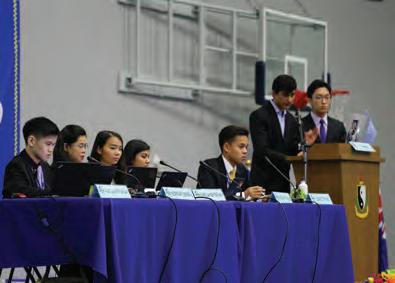
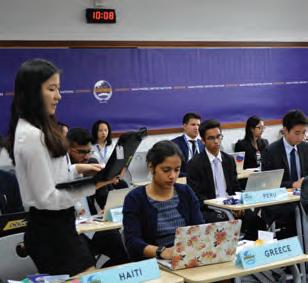
TAS MUN
TAS hosted over 200 delegates from 19 schools in 10 different countries for this year’s Interscholastic Association of Southeast Asian Schools (IASAS) Model United Nations conference. The event’s theme focused on “empowering the youth” through lobbying, debates, and negotiation. The conference began with opening speeches and ceremonies. Intense sessions of lobbying and debate took place over the next three days, and concluded with a General Assembly. During the event, committees of delegates formed and debated critical issues ranging from climate change to managing the European migrant crisis. Students kept the theme of youth empowerment in mind while negotiating solutions to these challenging issues. IASAS Model United Nations’ mission is to bring people of various backgrounds together to promote peace, develop a strong understanding of what it means to work with those who have different perspectives, and to come up with diplomatic solutions. This year, participants advanced this mission in a collaborative and meaningful way.
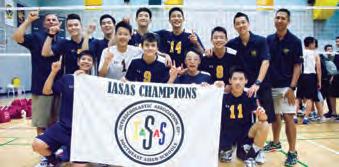
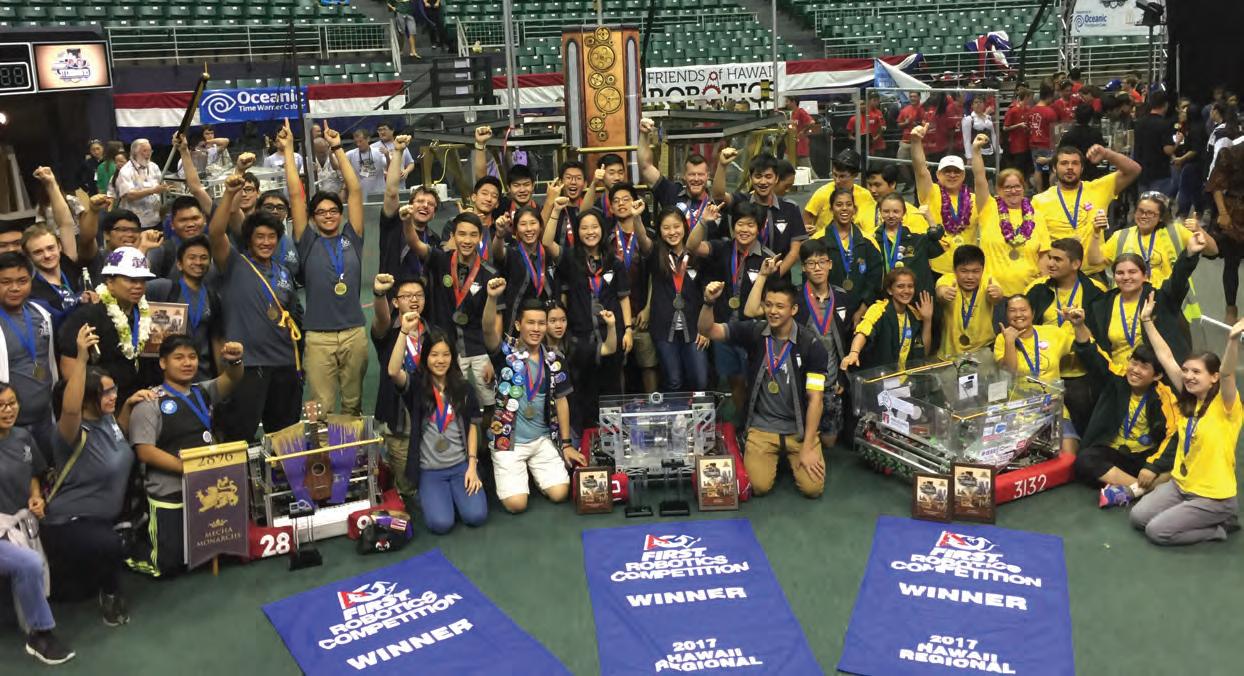
•••••••••••••••••••••••••••••••••••••••••••••••••• •••••• ••••••••••••••••••••••••••••••••••••••••••••••••••••••••••••••• •••••••••••••••• ••••••••••••••••• •••••••••••••••••••••••••••••••••••••••••••••••••••••••••• •••••••••• •••••••••••••••••••••••••••••••••••••••••••••••••••••••••••••• ••••••••••••••••••• •• ••••••••••••••••••••••• ••••••••••••••••••••••••••••••••••••••••••••••••••••••••••••••• ••• 6 TAS First Robotics Team Qualifies Twice for World Championship TAS Team 4253 Raid Zero won the 2017 Hawaii Regional FIRST (FRC) Robotics Competition! This spectacular first place finish came just weeks after their second place finish at the South Pacific Australia Regional competition. Both achievements qualified the team for the World Championship in St. Louis, Missouri. FRC Coach and Chair of the Upper School Robotics and Computer Science Department Mr. Matt Fagen commented, “None of this would be possible without the school’s unwavering support of our program and of our students. Our team is sincerely thankful for the opportunities the school
has provided for them.” In Hawaii, Team Raid Zero ranked first in qualification matches by a decisive margin and went on to lead the first seed alliance as captains. Impressively, they went undefeated through the finals. Mr. Fagen was especially proud of their hard work. He said, “TAS was the dominant force at this highly competitive regional and handily defeated reigning champions and Hall of Fame teams.” The team was also awarded the Engineering Inspiration Award for its outstanding impact promoting STEM education and enthusiasm for engineering in their community. TAS was recognized for the rapid growth of the program, for starting up two new FRC teams in Taiwan, and for the volunteer work the IASAS (Interscholastic Association of Southeast Asian Schools) Gold Medals This year, the boys volleyball team and the boys and girls golf teams captured their second consecutive IASAS championships! The girls cross country also won gold at IASAS (for the first time in twenty years), as did the girls basketball team (for the fourth time in the history of the program), and the girls track and field team (for the first time since 2008)! Additionally, the girls badminton team took home its fourteenth consecutive gold medal. Go Tigers!

team does teaching programming and engineering to local Taiwanese students in communities where STEM education is not readily available. In Australia, Team Raid Zero rebuilt their robot, dropping twenty-five pounds to increase its ground and climbing speed. The strategy worked, reducing their rope climb by ten seconds and allowing them to go almost undefeated through the qualifying rounds. In the fourth match of the semifinals, Raid Zero came up with a clever way to earn one more point to advance to the finals where they earned a well-deserved silver medal as well as the Engineering Quality Award for an exceptionally robust robot design and build.









